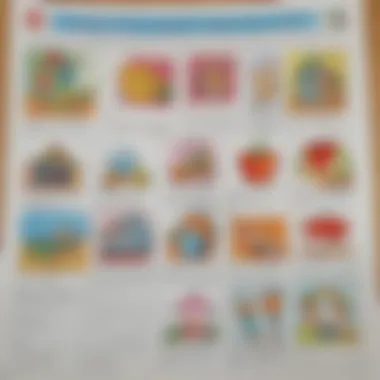Exploring the Impact of Pre-KG Worksheets on Learning


Intro
Pre-KG worksheets serve as a fundamental component of early childhood education. They engage young children in cognitive development and the acquisition of essential language skills. Moreover, these worksheets harness opportunities for social interaction among peers, crucial for holistic growth. This article aims to delve into various facets of pre-KG worksheets, illuminating their significance in preschool settings and providing practical strategies for their effective use.
Creative Activities
Engaging children in creative activities can transform the learning experience from monotonous drills to enjoyable explorations. Worksheets often include a variety of craft ideas that appeal to the imagination and stimulate motor skills.
Craft Ideas
Children can benefit greatly from hands-on crafting endeavors. Simple projects, such as constructing animals from paper plates or making greeting cards, can foster creativity. The cloning-out of ideas allows kids to replicate designs easily, reinforcing skill building.
Step-by-Step Guides
Clear instructions are key in guiding children through creative tasks. For instance, materials like colored paper, scissors, and glue can be introduced in structured steps:
- Gather Materials: Collect colored papers, scissors, glue, and markers.
- Design the Craft: Encourage children to outline the shape on the paper.
- Make the Cuts: Guide the children as they cut along the outlines carefully.
- Assemble: Have them glue pieces together to create a finished product.
Educational Value
Participating in crafting activities can significantly enhance fine motor skills and spatial awareness. In this way, children learn while creating, combining fun with educational value. Researchers underline that such activities directly support cognitive development.
Fun Quizzes
Quizzes tailored for young learners prepare them for a more interactive learning environment. Various topics can light up curiosity and seek to solidify knowledge.
Quiz Topics
Worksheets often integrate themes like colors, numbers, and animals. These engaging topics cater directly to preschool learning modules. A well-designed quiz not only tests knowledge but promotes self-confidence in mastering basic concepts.
Question Types
Children thrive with diversity in questioning styles. Worksheets may feature multiple-choice questions, fill-in-the-blanks, and true/false statements. This variety captivates interest and caters to different learning preferences.
Knowledge Reinforcement
Through consistent practice in quizzes, children have opportunities to revisit learned concepts, aiding both retention and application. Engaging quizzes solidify grasp of educational subjects and tempts kids to think critically about what they encounter.
Fact-Based Articles
Utilizing fact-based articles along with worksheets allows children to expand their knowledge scope while reinforcing literacy skills. Precise information caters to budding young minds through organized content.
Topics
A range of subjects is vital for curiosity. Articles might explore everything from weather changes to animal characteristics. Each topic serves as a building block for additional understanding.
Engaging Content
Authors of educational articles strive for clarity and engagement. Information is structured in ways that foster comprehension, ensuring they capture young learners’ attention without overwhelming them.
Understanding Pre-KG Worksheets
Pre-KG worksheets are an increasingly vital part of early childhood education. Their significance lies not only in supporting academic preparedness but also in nurturing both cognitive and emotional skills necessary for young children's development. This section delves into what exactly Pre-KG worksheets entail, providing a sturdy footing for understanding their benefits and relevance.
Definition and Purpose
Pre-KG worksheets are educational resources designed for children typically aged four and five. They serve several purposes within the educational landscape. One of the primary functions of these worksheets is to introduce foundational concepts in various subjects such as math, language, and science.
These worksheets provide structured activities that encourage children to explore letters, numbers, shapes, and more. The activities are often engaging and interactive, aiming not just to teach but to ignite a sense of curiosity. Teachers and parents can observe the comprehension levels better as the child's output enhances knowledge retention. We can consider Pre-KG worksheets as a bridge that helps young children transition smoothly into more formal schooling environments.
Role in Early Childhood Education
The role pre-KG worksheets play in early childhood education can hardly be overstated. First and foremost, these resources foster critical developmental skills. Engaging with these worksheets, children practice their fine motor skills, which are crucial for later tasks such as writing.
Secondly, they promote cognitive skills like memory, problem-solving, and analytical thinking. Activities on these worksheets often present children with challenges, encouraging them to brainstorm solutions, thus preparing a strong base for lifelong learning.
Moreover, pre-KG worksheets also support Social-Emotional Learning (SEL). Working through these worksheets can encourage cooperation among peers. Sharing materials and discussing solutions instills important social values. Educators integrating these resources into their curriculum find value in using assessed progress to form partnerships between students, teachers, and parents.
Pre-KG worksheets combine fun with fundamental educational theories in a way that resonates deeply with young learners.


In summary, Pre-KG worksheets play an indispensable role in preparing children not just academically but socially and emotionally. They address core developmental aspects and provide necessary tools for both parents and educators to enhance the overall learning experience of preschool children.
Types of Pre-KG Worksheets
Types of pre-KG worksheets play a crucial role in early childhood education by catering to various developmental needs and learning styles. Each type targets specific skills, leading to holistic growth of children. Moreover, they introduce fundamental knowledge in diverse subjects and promote engagement through various fun activities. It is important for both educators and parents to choose worksheets that are age-appropriate and align them with the child's interests for maximum effectiveness.
Coloring Worksheets
Coloring worksheets serve as an important tool for fine motor skills development. Coloring allows children to practice holding pencils or crayons, enhance hand-eye coordination, and boost concentration. These activities also foster creativity and provide a foundation for artistic expression. In addition, as kids select colors and decide where to apply them, they exercise decision-making skills and appreciate aesthetics.
- Benefits include:
- Development of finger dexterity
- Improvement in focus and concentration
- Encouragement of creativity and expression
Coloring worksheets can incorporate themes such as animals, nature, or everyday objects, which can spark children's curiosity and encourage a conversation around colors and shapes.
Tracing and Writing Worksheets
Tracing and writing worksheets are key for developing letter recognition, early writing skills, and promoting literacy. When children trace letters and shapes, they build muscle memory, creating a foundation for their writing skills later on. This practice not only aids in learning the alphabet but enhances reading readiness as they begin to connect sounds to symbols.
- Key aspects include:
- Promotes fine motor skill development
- Teaches letter formation and name recognition
- Encourages an understanding of the written word
This method helps to make writing activities less daunting for young learners. Introducing fun and variety within the worksheets keeps them engaged.
Math and Number Activities
Math and number worksheets introduce young learners to basic numerical concepts. These worksheets can vary from counting objects to simple addition and subtraction problems. Through fun activities, children learn how numbers relate to the real world.
- Significant tools include:
- Counting worksheets with visual aids
- Simple problem-solving tasks
- Shape recognition and sorting exercises
This exposure builds a foundational capacity that is vital for future mathematical learning. Encountering fun math in early education also helps reduce anxiety around this subject later on.
Reading and Language Worksheets
Reading and language worksheets focus on developing early literacy skills. These sheets often include picture reading, matching words to images, or simple sentence formation. They lay a crucial groundwork for understanding vocabulary, sentence structure, and the intricacies of language.
- Core elements include:
- Vocabulary building exercises
- Simple reading comprehension tasks
- Phonics activities that engage sound recognition
All of these activities not only promote language proficiency but also instill a love for reading at a young age, fostering lifelong learning habits.
Science and Nature Worksheets
Science and nature-related worksheets introduce young children to the natural world. They can learn about animals, plants, and basic scientific concepts in a fun way. These worksheets not only offer knowledge but spark curiosity about the environment.
- Included aspects are:
- Experiments and observation prompts
- Animal and plant identification worksheets
- Simple facts about seasons or weather patterns
Through exploring nature and scientific principles, young learners are encouraged to think critically and engage with the world.
Social Skills and Emotional Learning
Worksheets focusing on social skills and emotional learning provide the tools needed for children to understand their own feelings and the feelings of others. They foster empathy, cooperation, and communication, which are vital for navigating social interactions.
- Critical focus areas include:
- Identifying emotions through visuals
- Role-playing scenarios or problem-solving social dilemmas
- Discussions around cooperation and sharing
These activities help children learn to articulate their feelings, build relationships, and develop conflict resolution skills, enriching their emotional intelligence.
By utilizing a variety of worksheets, parents and educators can ensure children encounter diverse learning experiences that nurture their overall development in engaging and effective ways.
Benefits of Using Pre-KG Worksheets


Pre-KG worksheets serve more than just a simple activity for young children. They are designed to pave the way for crucial developments that benefit children holistically. These worksheets can significantly boost cognitive and language skills while also fostering social interaction among peers. Understanding the benefits of using these educational tools is crucial for parents, caregivers, and educators. This knowledge enables them to harness worksheets effectively in early learning environments.
Enhancing Cognitive Skills
Critical Thinking
Critical thinking is a vital skill for children as it encourages exploratory learning. By engaging in tasks that require reasoning and deduction, children learn how to assess their thoughts. This skill enables them to make informed decisions.
A key characteristic of critical thinking is its focus on individuality, allowing children to form their opinions. It cultivates a mindset that is inquisitive and analytical, which certainly is essential for academic success. Children learn to approach problems logically by evaluating information instead of taking it at face value.
The use of worksheets that demand analysis rather than rote learning nourishes this quality. They encourage children to ask questions and explore various solutions. These aspects ensure that critical thinking remains a central focus of their education.
Problem Solving
Problem solving is another crucial cognitive skill highlighted in Pre-KG worksheets. This aspect involves identifying issues, gathering information, and generating solutions. Worksheets designed with logical puzzles or practical scenarios necessitate that children engage actively in finding answers.
A distinguishing feature of problem-solving exercises is their real-world applicability. They help children understand that challenges are a part of life and can often be resolved through reasoned strategies. This feature is desirable in this article as it showcases practical learning skills that children can utilize beyond the classroom.
These worksheets can help train young minds to face problems calmly, illustrating that effort leads to success. By developing this skill at an early age, children are better prepared for complex challenges in their future education and life.
Developing Language Proficiency
Language proficiency captures the ability to understand, speak, read, and write effectively. Pre-KG worksheets targeting general vocabulary, sentence structure, and reading comprehension enable children to advance their language skills early on. Regular practice using these worksheets cultivates a strong language foundation within a nurturing environment.
Worksheets can introduce children to new words and encourage them to use the language analytically, thus enhancing their speaking abilities systematically.
Fine Motor Skills Development
Fine motor skills pertain to the small muscle movements involved in a variety of tasks, such as writing and drawing. Engaging in worksheet activities involving coloring, tracing, or cutting delightful shapes requires precision. These activities enable children to refine their hand-eye coordination and dexterity.
As these skills enhance, children become better positioned to handle daily tasks such as buttoning shirts or utilizing utensils independently. Strengthening fine motor skills is critical in the developmental stage of preschool learners.
Promoting Social Interaction
Worksheets can act as a gateway for children to engage socially, whether in group learning or an interacting classroom. Making use of these worksheets in collaborative activities fosters discussions and teamwork, crucial elements in early childhood.
Through worksheets, children learn how to share ideas, listen to others, and respect different viewpoints. This enrichment ultimately helps build essential communication skills. Programming activities involve matching tasks, where collaboration leads to problem-solving discussions, showcasing the social aspects ingrained in the learning process.
In summary, Pre-KG Worksheets are valuable for bridging various skills necessary for young learners. By facilitating cognitive enhancement, language development, fine motor skills, and social interaction, they formulate an essential part of children's early education experiences. By leveraging such resources, parents and educators set a robust foundation for lifelong learning.
Aligning Worksheets with Educational Standards
Aligning worksheets with educational standards is key for maximizing their efficacy in promoting a child's learning. This ensures that techniques and practices promote developmental benchmarks whilst fostering creativity and critical thinking. Educators and parents must understand how worksheets can fit into both established educational frameworks and the evolving landscape of early learning.
Understanding Early Learning Frameworks
Early learning frameworks outline the expected outcomes for students in their formative years. They encompass developmental milestones that support cognitive, social, and emotional growth. These frameworks provide a tailored structure to guide parents and educators when selecting relevant worksheets. By familiarizing with mindsets such as the Head Start Framework or Montessori methods, stakeholders can better identify quality worksheets that reinforce essential learning areas.
- Focus on Developmental Levels: Understanding the age-appropriate stages for tasks. Ensure each worksheet reflects these levels.
- Encourages Holistic Growth: Well-aligned worksheets foster broad skills. This includes not only academic skills but social and emotional regulation.
- Cultural Relevance: Ensure that the selected materials reflect the children's backgrounds, aiding in engagement and relatability.
Incorporating sheets compatible with these educational frameworks leads to increased relevance within learning environments.
Align worksheets with developmental standards to ensure the tasks meet the necessary skills young learners must cultivate.
Selecting Quality Worksheets
Quality is a pivotal aspect when choosing worksheets for pre-KG students. Not all worksheets are created equal. They should not merely entertain; rather, they should contribute meaningfully to learning objectives.
When selecting effective worksheets, consider the following:
- Alignment with Standards: Ensure each worksheet supports specific learning outcomes relevant to assessments and developmental goals.
- Age Appropriateness: The complexity should match children's abilities. This means assessing not just the content, but also engagement potential.
- Interactive Nature: Choose worksheets that encourage participation rather than rote work. Interaction breeds engagement and drives curiosity.
- Visual Appeal: The design should attract young learners' attention and keep them interested in the tasks presented.
- Variety: Inclusion of different types of learning aids, such as puzzles, drawing, and tracing, allows a comprehensive learning experience.
In summary, selecting high-quality worksheets aligned with standards serves to maximize educational benefits for pre-KG students. Adopting a thoughtful approach guarantees a productive and engaging learning atmosphere.
Practical Tips for Parents and Educators
Pre-KG worksheets can greatly assist in a child's learning process, but their effectiveness can be amplification with proper guidance from parents and educators. This section will focus on practical and applicable strategies for creating a conducive learning environment, integrating worksheets into every day activities, and tracking the lick development of skills alongside encouragement for the child. These tips can lead to a more enriching and productive educational journey.
Creating a Suitable Workspace


A workspace can seriously affect children's focus and ability to learn. It is vital to decide on a suitable area that is specifically designated for learning, free from scares distractions such as TVs or mobile devices.
Here are vital aspects to consider when creating a suitable workspace for children:
- Location: a quiet place with lot of natural lighting can encourage more cognitive attention.
- Organization: All necessary materials, like pencils, papers and other resources, should be easily available.
- Comfort: Kids should have a comfortable chair and table that fits their height, ensuring they are not strained during learning sessions.
Overall, the aesthetic can matter too. Bright colors and fun designs can make this learning space more appealing, keeping kids invest in it.
Integrating Worksheets into Daily Learning
Incorporating worksheets into interactions can smoothly promote continual learning. Consider variant techniques to embed these activities into the typical daily routine:
- Start with morning tasks: Use morning time to engage youngsters with math or language worksheets while they are freshest.
- Utilize car time: While driving, ask children to trace letters or images from worksheets provided to them earlier.
- Dinner Discussions: Worksheets covering social skills can lead to deep discussions around the dinner table, providing connections between content and real life.
Integrating worksheets inline with an already set daily functions support consistency in practice and makes the learning process natural.
Tracking Progress and Encouragement
Monitoring progress is beneficial for both kids and parents. Children blossom when they see growth in their skills. One efficient way to do this is through acknowledgment and working towards key achievements in the worksheets.
Important strategies include:
- Setting Fun Goals: Setting small objectives on the worksheets gives children a structured target.
- Daily Check-ins: Have brief conversations about what they learned each day and discuss best answer and methods during a review session.
- Create a Celebration Board: Celebrate small (or big) accomplishments by making a board that visually tracks their progress with stars or stickers, positively reinforcing their developments.
While tracking is vital, it mustn't feel tedious but empowering. Verbal encouragement or simple rewards for effort can boost motivation. Let the child see that their progress spell transformation.
This consistent process of tracking progress can pave the way for advanced learning methodologies as children progress in further lessons.
These topics can help parents and educators navigate this crucial developmental stage effortlessly while facilitating enhancement in educational experiences designed for young learners.
Challenges and Considerations
When examining Pre-KG worksheets, it is crucial to address the challenges and considerations that come with selecting and using these educational tools. There are two primary aspects to think about here: the overwhelming variety of worksheets available and how to maintain the right balance between structure and creativity. These elements play a significant role in the effectiveness of worksheets in developing skills in young learners.
Overwhelming Choices
The market is flooded with numerous worksheets aimed at pre-KG children. Parents and educators often find themselves facing a seemingly endless array of options. Some sheets are colorful and engaging, while others focus more on academic rigor. Understanding how to sift through this vast selection can be confusing.
Moreover, while choices can enrich a child's educational experience, too many may lead to decision fatigue. Implementing a systematized approach to selecting worksheets helps prevent this problem.
- Prerequisites for Selection: Prioritize worksheets that align with educational goals. It can be beneficial to look for resources that support the curriculum being taught in the classroom or at home.
- Engagement: Seek worksheets designed not just for skill development but also for fun and motivation. Active engagement is important for sustaining interest and enthusiasm in learning.
- Age Appropriateness: Ensure the materials cater to the skill levels of pre-KG students. Avoid overly complex tasks, as they may discourage younger learners.
By keeping these selection strategies in mind, time spent on evaluating and choosing worksheets can become more effective and productive. This hightened focus boosts the potential for positive learning experiences, encouraging cognitive development and fostering a love for academics.
Balancing Structure and Creativity
Another important consideration involves achieving a balance between structure and creativity when using Pre-KG worksheets. While structure provides a sense of consistency and progress, creativity fosters the child’s natural curiosity and imaginative skills. Finding the right equilibrium is key to optimal learning.
Worksheets like tracing exercises are valuable for developing fine motor and handwriting skills. Structure here aids in honing focus and repetition. On the other hand, open-ended activities, like drawing or storytelling prompts, inspire children to think outside the box. This not only cultivates their creativity but enhances language and cognitive skills as they narrate their thoughts:
- Each Activity's Role: Advantageous to mix both structured and unstructured worksheets. For example, alternating between a structured math worksheet and a creative art task
- Creative Expansions: Designs that encourage children to come up with their own content, rather than simply filling out blanks or answering questions, can result in superior engagement levels.
Children benefit from sessions where they can express their individuality while still adhering to some learning frameworks. By maintaining this delicate balance, parents and educators can facilitate a rich educational experience that champions both cognitive development and self-expression.
In essence, understanding the challenges involved with choosing the right worksheets forms a foundation for richer learning that develops necessary skills for future endeavors.
Future of Pre-KG Worksheets
The evolving landscape of education necessitates a reconsideration of pre-KG worksheets. With continuous advancements in technology and pedagogical strategies, the future of these worksheets indicates a shift toward more dynamic and interactive forms. These adaptations not only enhance the learning experience for children but also present new opportunities for educators and parents. It is essential to understand these shifts to maximize the benefits that pre-KG worksheets can provide.
Adapting to Digital Learning Trends
As we move further into the digital age, pre-KG worksheets are increasingly transitioning from paper-based formats to digital platforms. This change opens up various avenues for engagement and learning. Digital worksheets can incorporate interactive elements, such as videos, sounds, and animations, offering a multisensory experience that appeals to young learners.
The incorporation of tablets and computers allows for a personalized learning experience. For instance, educational apps tailored specifically for pre-KG curriculums provide immediate feedback through gamified experiences. Students can learn at their own pace. Therefore, accessibility increases for children with varying learning styles and needs. While adapting to these digital trends, considerations must still be made regarding screen time and content quality. Educational resources must always align with developmental guidelines to ensure safety and educational value.
Evolving Educational Needs
As society shapes new priorities, the educational landscape continuously evolves. The needs of today's learners greatly differ from those of previous generations. Therefore, pre-KG worksheets must also adapt. Evidence suggests that skills such as critical thinking, creativity, and emotional intelligence are becoming increasingly important.
Worksheets need to evolve, encouraging inquiry-based learning and problem-solving skills. Activities that demand collaboration, such as group exercises, equip children with social skills necessary for the future. Additionally, the inclusion of themes addressing global awareness and diversity can promote inclusivity from a young age.
Quote: Continued adaptation and creativity in educational resources are key to preparing children for a rapidly changing world.
To summarize, as technology grows and educational priorities shift, understanding the direction for pre-KG worksheets is critically important. Parents, educators, and policymakers must work together to make educational materials more effective. The role of these worksheets is undoubtedly significant in nurturing the skills that young learners will need in the future.







